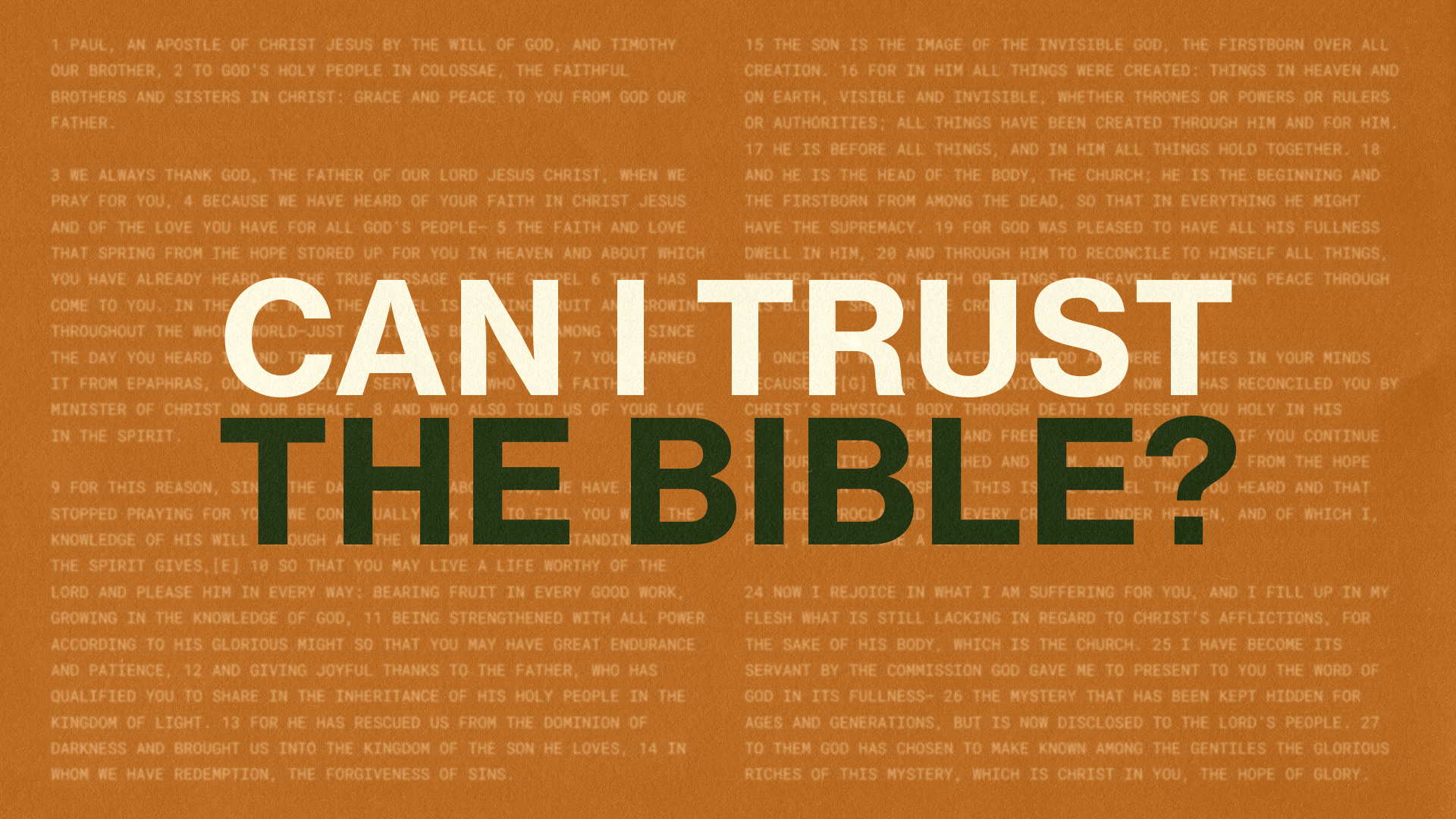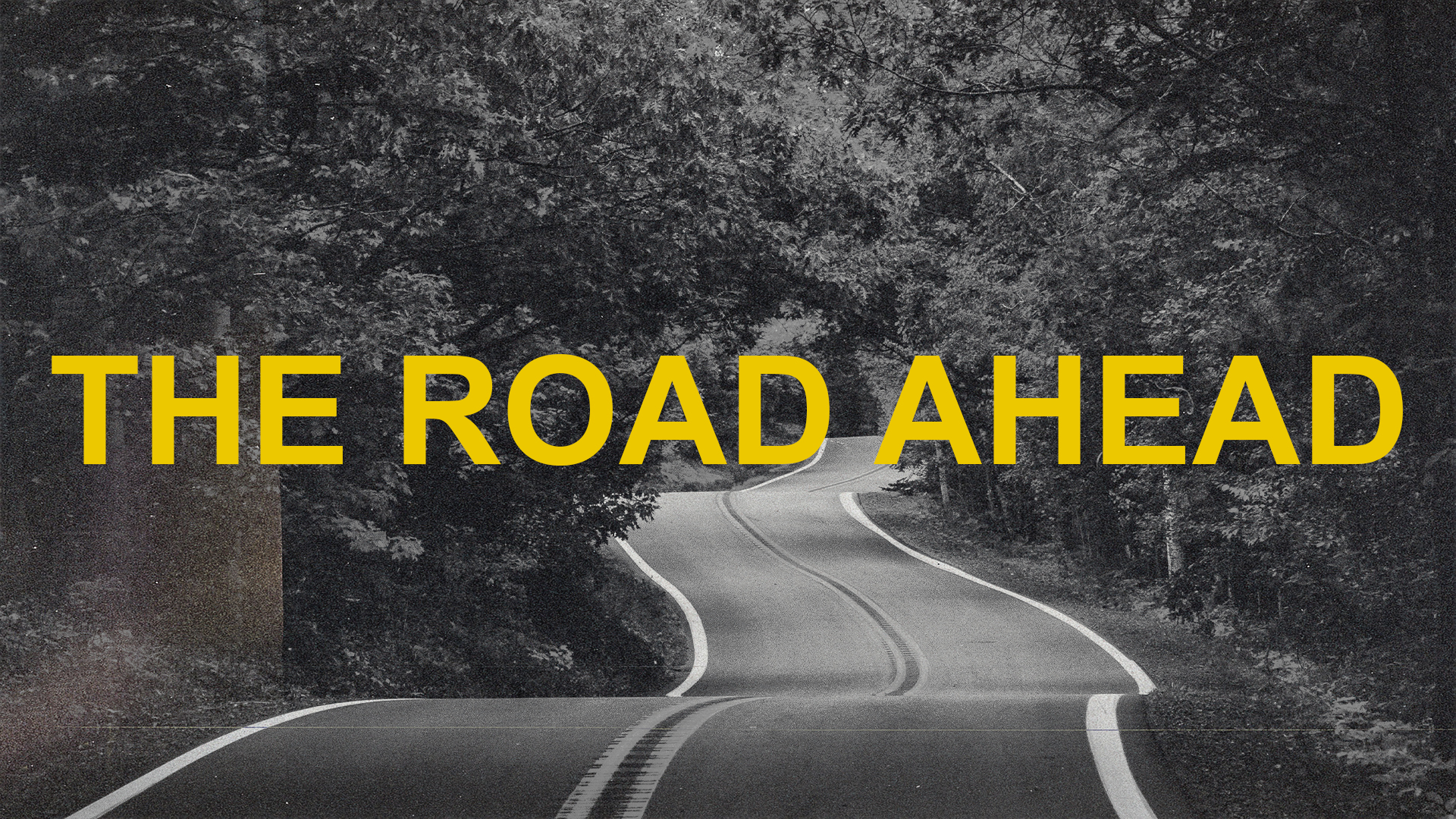Ancient Paths
Discussion & Practice
- Read Jeremiah 6:16. Where do you sense restlessness in your life the most? How does this restlessness change in different seasons of life?
- "Stand by the ways and see..." When you stop and evaluate the path you're on, what are some ways you can see the cultural environment forming you; the way you think, feel, act, or even what you love?
- Spend some time identifying potential idols in your life. What are some of your go-to fantasies or greatest fears? What do they reveal about your heart?
- How can you begin limiting the distraction of technology to make space for the quiet? What are some limits you feel convicted about setting up in this area?
- What are some guideposts you've set up in your life for when you go off track? How does the community play a role here?
Practice: Stand, See, Ask, and Walk. Journaling exercise based on Jeremiah 6:16. Stop and evaluate the path you're on and how the cultural environment is forming you. What potential idols can you identify based on your go-to fantasies and fears? Ask God for the ancient paths, to both reveal them to you and empower you to live it out. How can you make this practice of stopping, evaluating, asking, and obeying a regular part of your walk with Jesus?
Notes
Further Recommended Reading
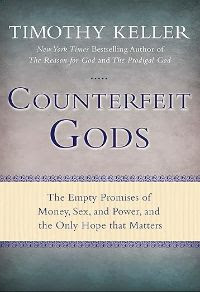 Counterfeit Gods: The Empty Promises of Money, Sex, and Power, and the Only Hope that Matters
Counterfeit Gods: The Empty Promises of Money, Sex, and Power, and the Only Hope that Matters
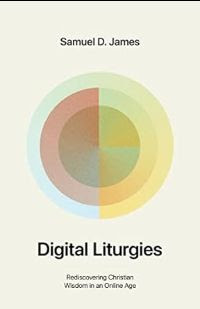 Digital Liturgies: Rediscovering Christian Wisdom in an Online Age
Digital Liturgies: Rediscovering Christian Wisdom in an Online Age
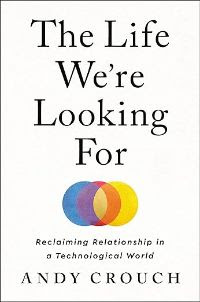 The Life We're Looking For: Reclaiming Relationship in a Technological World
The Life We're Looking For: Reclaiming Relationship in a Technological World
We’re taking a brief pause this week from our series to consider what it is that is making us so restless.
You may feel this restlessness rear its head at different times in the form of unbridled passions, addictions, or the desire to succeed at any cost; or maybe you feel it in the form of crippling anxiety, depression, or loneliness.
We are always on the move to secure the future for ourselves because of either our passions or to stave off paralysis. We are naturally bent towards minimizing pain and maximizing pleasure, and so we’re always on the move.
St. Augustine famously said, “You have made us for yourself, O Lord, and our heart is restless until it rests in you.”
Augustine is saying that our restlessness, even for all the misery it causes, is actually a feature of our personhood, not a bug. It’s built into the fabric of our being, like a homing beacon, to indicate when we’ve strayed off the path. We will never be fully satisfied apart from trust and enjoyment in God, because that is why we were made. It’s built into every human being.
But in a world obsessed with novelty and innovation, we’re always looking for a fresh way forward, a life hack that will get us there faster and more efficiently.
Yet, the call of God is to ask for and walk in the ancient paths.
Culture tells us to blaze our own trail, but God says there is a well-worn way. The same one walked by the saints who went before us, as well as our Savior himself, and it also happens to be the only way.
Even though this ancient path hasn’t moved, our environment can make it harder to identify. There’s a parable you’ve probably heard about these two young fish swimming along in the ocean one day as they pass an older fish. As he passes by, the older fish says something to the effect of, “Hey boys, how’s the water today?” The two fish swim by, look at each other completely confused, and one of them says, “What the heck is water?”
The point of the parable is that the most obvious and important realities of our lives, the very environment we’re swimming in, so to speak, is often the hardest to notice, because we’re immersed in it and take it for granted. Whatever we don’t have to think about, like breathing, we forget about. They’re the background processes that run constantly in our lives automatically and without much effort.
The issue is that the environment we’re immersed in, our culture and its seemingly "neutral" daily habits, are not actually neutral. That environment is forming us into a kind of people who think and react and feel our way through life in specific ways. We know our restless hearts need rest, but we don’t know why exactly we’re so restless.
We need to pause and see how the environment around us is shaping us. What story is our everyday life weaving into us? Because much of it is counter to the way of Jesus, but the automatic responses of our bodies are very much shaped by our environment and habits.
How do we find and walk the ancient path in a restless world obsessed with speed and novelty that is always unsatisfied and needing more? Most of history was lived at three miles per hour, roughly the speed of walking. Now we race through life where every minute seems to matter. How can we live the way of Jesus in the environment or the waters of this cultural moment?
Jeremiah 6:16 is our text today and will serve as our guide. God speaks through the prophet Jeremiah to pronounce judgment on the people of Judah who went the way of the world. But God had been so patient with them for generations and was constantly calling them back to these ancient paths, like he is here in chapter 6, verse 16:

There are four imperatives here in this verse: Stand, See, Ask, and Walk. These are going to make up the structure for where we’re headed today.
First, God is calling them to stand by the ways, or at the crossroads, meaning, rather than barreling forward, just slow down and stop for a second. Observe where you’re headed. Stop and see where your current path is taking you. Take a moment to define reality.
Then, ask for the ancient paths and walk in it. Once you define reality and realize what environment you’re swimming in, God wants you to ask him for the ancient path and intentionally live it out. This isn’t a new, novel path. It’s an ancient one that’s been traveled and proven to be good. But with the rapid advancement of technology and innovation, people are asking if this path is still viable or relevant. This is a call to return to the well-worn path of Jesus.
So, we’re going to start by defining reality. What is the water we’re swimming in? Then we’re going to ask for the ancient way––how we can live an eternal kind of life that God offers a restless world?
There are two major metaphors that are carried throughout Jeremiah: Roads and Rivers. They convey a similar idea. We’re restless on the road and we are thirsty people.
Water represents our source of life and vitality, and the roads represent where our life is ultimately aimed and the manner in which we live as we journey through it.
All through the Bible, human beings are presented as restless and thirsty.
God warns the people of Judah through the prophet Jeremiah that judgment is coming. He says it’s because they’ve committed two evils:

This is a picture of idolatry. An idol is not just carved wood or stone, but anything that takes the place of God in your life––anything that takes over your heart and imagination and seeks to give you what only God can give. We know that even good things can become idols.
Here, Judah has turned away from God, the source of all life, and tried to become their own source of life or rely on other sources apart from God. Their restless and thirsty hearts said, “Yeah, this living water is good, but can’t we have both ways?”
The cisterns provide a contrast with living, flowing, spring-like water. Cisterns would rely on outside circumstances like rain, and the water would be stagnant. It’s not moving or replenishing. More than that, God is saying the things they’re putting their trust in are like broken cisterns that couldn’t even hold any water.
Judah was actively seeking out the other nations for their prosperity and protection. Putting their hope and trust somewhere other than God. And they turned their hearts to the gods of the other nations for their satisfaction and protection and prosperity.
Tim Keller points out in his book Counterfeit Gods that one way to find out what has taken up residence as an idol in your heart is to ask what you daydream about and what your nightmares consist of. What is the source of your greatest fantasies and your greatest fears?
I remember Pete bringing this up years ago and I thought, well, my favorite go-to daydream is that I’m a superhero that’s a mix of Iron Man and Wolverine. It sounded goofy and I laughed it off before I thought about it more and realized what I wanted was to be limitless. I didn’t want to have the same limitations as a normal human being and have to sleep or heal or get tired. I wanted to be able to go from one place to another and have all the money and strength I needed to fix a problem. I wanted to single-handedly protect people close to me and not have to rely on anyone else. It sounded goofy, but this seemingly harmless fantasy revealed I wanted to be my own source of life.
Then I realized that’s why I stay up so late some nights. There are too many things I want to do or feel like I have to do or I just want to spend time winding down with a book, and sometimes it’s can be hard for me to be grateful for a full day and receive sleep as the gift that it is––a lot of times I just try and squeeze more and more out of the day.
Much of the technology we consume, not that it’s inherently bad, is an attempt to gain superpowers and be limitless––to transcend our human limitations. Think about that advances in social media, FaceTime, fast cars, and international flights. We are less and less limited by time and space. We can go virtually anywhere we want and are less bound by our location. Even in the midst of lockdowns, we could get out in a disembodied way.
Yet what is known as the age of connectivity is also known as the age of loneliness.
With the speed of data transfer and new AI tools, ultra-fast internet and satellite links in remote places for the internet, calendar tools, leadership development strategies, and productivity hacks, the world is less and less bound by time as it soars through and becomes more productive.
Yet this golden age of productivity is also known as the age of burnout.
Even in the midst of economic recession, most of us here have access to more pleasures and comforts than many people could ever hope for, both good and taboo. There are more ways to get high, get drunk, indulge your fetishes, numb your troubles, or heighten your senses than previous generations would ever think possible. Moving from one screen to the next through the day, between a work computer, tablet, TV, and iPhone, working, playing games, bingeing shows; you can pull up anything you want at any time like magic, or have whatever you fancy shipped to your house anywhere from two days to two hours.
Yet the age of abundance is an age of depression and despair and loss of identity.
We’ve lost the ability to just sit in a moment and reflect. Yet, we’re outraged by everything, along with everyone else and we feel the need to express it. It’s as if not expressing an opinion would make me a little less myself. So, then we lose ourselves in consuming more and more content so that I can be told what to be outraged about next. We are consumed by content.

We live in an age of relativism and radical individualism. We want to pave our own way and find sources other than God or religious institutions. Every man’s own word becomes the authority. And we don’t sit long enough in silence or in Scripture to hear anything else.
That’s the water we’re swimming in, and that’s what is forming us and the way we think.
Beyond the soul-crushing effects this has on us as human beings, there is physiological change that is happening in our bodies and our brains. The amount of dopamine that we’re fed on a regular basis from all the devices that never get shut off is a society-wide, socially acceptable addiction. We’re hooked.
We have to define this reality, because all of us swim in these waters, yet many of us never question how it is forming us. Our bodies, minds, souls, and energy are being rewired and told what to love. We don’t need to get rid of technology, or go backwards. But we do need to know how it is forming us and how we rely on it as a source of life if we’re ever able to find counter-formative practices that shape us in the direction we’re supposed to go.
If you want help down that road, there are a couple of books that are asking all the right questions from a deeply theological perspective called Digital Liturgies and The Life We’re Looking For. They’re looking at how technologies form us and how we can respond.
One of the examples had to do with the invention of central heating in the home. Obviously, nobody would ever suggest we go back to a time before central heating and cooling, but before it was invented, families had to huddle around the stove at the center of the home to keep warm. With the advent of central heating, architecture began to change and everyone got their own room, which led to more privacy and less time together as a family unit.
Again, no one would go back to a time before central heating and cooling. But you have to be able to define reality and see how the technology affected us to know what we lost and how to counter it, like making sure you have family dinners together.
Every technology promises new superpowers for something you’ll be able to start or stop doing. But sometimes it comes with more burdens or a shift in values.
In Jeremiah 17:19-27, it’s interesting that Sabbath is mentioned as an indicator that they no longer trusted in the Lord God. They didn’t want to stop and accept their limitations as human beings and accept the gift of rest and worship and delight, because they wanted more prosperity and they wanted the protection of the nations around them.
Their fears and fantasies drove them away from the living waters. They wanted shortcuts.
It’s funny, I've been trying to learn Spanish since January. Its funny to me when you see things advertised for language learning tools that say they’ll get you fluent in 6 weeks or some crazy number.
I’ve been trying to intentionally learn Spanish since about January. All these programs promise a fast track to fluency, but language learning is a slow process. Our favorite restaurant has a lot of people that don’t speak English, and we’ve made a lot of friends there just trying to speak Spanish and looking like fools. And one of the waiters has become a good friend of mine. I’ve even been out to lunch with, had him over to the house, he’s come here to church, and I even helped him get a bank account. He speaks less English than I do Spanish, but we’ll get together and try to talk to each other and teach each other’s language.
There are no short cuts. Life and language and relationships all move at the same slow speed down the same long road people have traveled for years.
Can you get there faster? Sure, but not by shortcuts. There are language immersion programs that will get you there more quickly, but it’s not a different path, it’s just a more intentional one. Same way you can have an intentional period of growth and discipleship in one of our D-Groups. But that is due to intentionality, not finding a shortcut. It's the same path.
Let's return to our framework in Jeremiah 6:16.

Once we stop long enough to assess where we’re going, where we’re putting our trust, where we’re drawing our life and vitality from, and get a feel for how we’re being formed along the way, then we’re called to ask God for the ancient path and walk in it. This is the way to find rest for the restless heart.
I love the progression of imperatives in this passage. Because he’s not just telling them, “Shape up! You went off the path! Do better!” This is an ongoing, regular prescription to stop, evaluate your life, ask God for direction, and respond to his Spirit.
Why does he tell us to ask? If the paths are the same ancient ones that have always been there, why not just start walking that way? Because the whole journey is grace. Remember, we’re not just evaluating the direction of our lives and the manner in which we get there. It’s not just about behaviors. We’re asking where we’re drawing our life and vitality from. That’s why both of these metaphors are so crucial.
If you go to Jeremiah 17, you’ll see he again switches the metaphor back to water. Remember, the road metaphor gives us more of a picture of the aim of my life, where it’s pointed, and the manner in which I live. The water metaphor gives a picture of where I draw my life and vitality from along the way. Where am I putting my trust?
So, in Jeremiah 17 we read:

The bush here is most likely the juniper bush, that lived out in the desert and had a twisted and contorted trunk. It was completely reliant on the circumstances around it, for the rain to bring any water.

The tree here is not reliant on the circumstances around it. When the heat and drought come it doesn’t fear and isn’t anxious, because it’s plugged into its source of life.
Notice that this tree is planted. This is passive. Just like in the metaphor of the paths we’re supposed to ask for it and then walk in it, this is showing God’s work of uprooting our whole root system from where we are and planting us by the stream so that we abide in him.
It’s a radical and invasive transplant. But then the tree extends its roots down to the stream in response to being planted there. The Hebrew verb stem is one that shows a multiplied or intensive action, because the tree is actively moving toward the stream as its source of life.
So, when we’re called to ask for the ancient paths, it’s because the whole endeavor is possible only by the grace of God. It’s all grace. We can’t merely expect to walk down the ancient path without any problems. We are totally dependent on God through his Word and prayer and community to reveal the ancient paths to us and empower us by his Spirit to walk it.
And you’re not too far gone. Though God is in the process here of judging Judah after so many generations, this says that they still found grace in the wilderness.

So many have wandered off the path and thought it was too late. Hear this message. The book of Hebrews says, as long as it is still called today, hear this message and don’t harden your heart. Scripture says that God is slow to anger and abounding in lovingkindness.

There’re our metaphors. Roads and Rivers. This is all by the grace of God. This is why we are called to ask for it.
And here is the end goal:

We ask for the ancient paths, God’s work to be done in us, and then we respond by walking in obedience along that road, empowered by his life-giving Spirit.
So, we see, it’s not just about shaping up and doing better. To walk in this obedience, you need to regularly take the time to evaluate which direction you’re going and how it’s forming you, ask God for help, and then you can respond to him and live according to an ancient way that is forming you into the kind of person you’ll be for eternity.
The Hebrew word for “ancient” in ancient paths is also the word for eternal. It’s his eternal way of living, from ancient times until time everlasting. His ways are perfect.
So, after God let’s these people of Judah be taken into captivity because of their sin, he promises to bring them back. And he says this to the remnant who will return:

When you go off the path, you should have guideposts to bring you back. What are those guideposts for you that direct your mind back to the way of God? What Scripture do you lean on? What time do you devote to prayer? How do you submit your life to community so that we can help bring each other back?
These aren’t novel. They aren’t life hacks. That’s why we’re reticent to try them at times. They’re ancient paths, tried and true.
Jesus was the only one to live it perfectly, and that’s why he said he is the way, the truth, and the life. He is the path. No one comes to the Father except through him.
If you haven’t started down that road with Jesus and accepted his free gift of salvation, I invite you to do that right now.
Maybe you would say, “That’s me. I’ve been living my own way, drinking from lesser sources of life. I want that living water to change me from the inside out and give me a new heart and set me on a new path.”
If that's you, you need to let someone know. We’ve been seeing in our current series that this is no private thing. You are not just saved from something; you are saved into a community and a new way of life.
I want to encourage you to take time to pause this week and evaluate the direction you’re going. Evaluate your passions where you tend to indulge or daydream. Evaluate your fears and anxieties. And evaluate how your everyday, mundane practices like your screen time may be forming you. Evaluate in community as you go through the sermon questions for today, and take time to pause and evaluate on your own in the silence away from your devices and distractions. Where am I going and how are my everyday habits and routines forming me?
Then, pray and ask God to give you his grace and show you the ancient paths. Repent where you’ve drifted away from him, and thank him for his unending grace to bring you back.
Then walk in obedience and set up markers to draw your mind constantly back to him.


